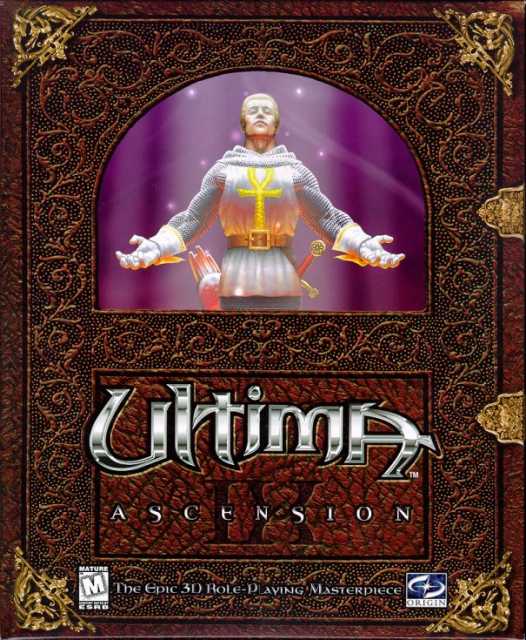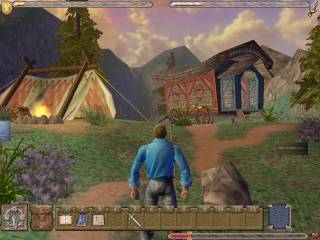Ultima IX: Ascension

Developer: Origin Systems (RIP)
Release Date: November 23, 1999
Time Played: A little over 3 ½ hours
Dubiosity: 5 out of 5. You might be able to convince me that it’s a 4 by simple value of “it’s pretty playable” but from a historical angle I can’t say anything less than a 5.
Virtues: 1 out of 8 (Sacrifice, probably)
Would I play more? You know, I’d rather play this weird franchise-killing piece of shit over more than half the other games I’ve played for this feature and I don’t know what that says about me.
Of every single game I’ve played on this feature so far, I cannot think of one more infamous than Ultima IX, the game that not only killed the Ultima franchise, but also killed Origin Systems after its disastrous release. It’s also, to be entirely honest, exactly the kind of garbage I want for this feature. I enjoyed my time with Ultima IX, not because it’s a good game, but because it’s the perfect combination of what I want out of a stream fodder dubious RPG. It’s an ambitious game from a renowned series which whiffs massively on execution, trying to appeal to both series fans and newcomers without quite managing either. It fundamentally misunderstands the Ultima series’ core themes and ideas, which sure is a problem given that it’s the conclusion to the franchise. I’m someone who deeply respects Ultima from afar, but as someone who wasn’t alive on this planet when most of the series’ games came out, I’ve found going back to them to be quite difficult. Nonetheless, it doesn’t take being an Ultima Expert to know why this game seems like “a real bummer” while still being the exact level of bullshit I’m willing to tolerate in an RPG like this.

A lot has been said about Ultima IX’s troubled development by the people who worked on it, Richard Garriott especially. In case you needed a reminder that Electronic Arts’ history of driving talented studios into the dirt goes back decades, look no further than Ultima IX’s “Holiday 1999 or bust” release date leading to massive swaths of cut content. I can’t speak to “what could’ve been” but the game as it is now is a little fascinating? Ultima IX brings a top-down party-based isometric series into the realm of a 3D, third person, single character, action-RPG. I think the transition would’ve been awkward even if the ideal version of this game had come into the world, but regardless the game that does exist is sort of fascinating in a “they were still figuring things out” sort of way. As my recent rude awakening revisiting Mario 64 has reminded me, game developers were still very much figuring out how games controlled in a 3D space during the mid-late 90s, and Ultima IX’s mouse-centric, utterly baffling UI and inventory management is no different. I am on the record as being entirely pro-Paper Doll inventory, but Ultima IX goes one step further by just asking you to awkwardly drag and drop equipment onto (your avatar) The Avatar. I think it’s supposed to be accessible? Accessible for whom I’m not entirely clear, but one gets the impression that putting most functions to the mouse was meant to make the game *easier* to handle.

Anyway, there are also some rudimentary physics and particle interactions in Ultima IX, which continues a lot of ideas established in games like Ultima VII, and are pretty impressive for the time period. You can light and extinguish torches, blow some things over with wind, or toss an infinite number of rocks at a stupid rat while your game audio redlines on stream. What are these mechanics in service of? Sub-Zelda dungeoneering puzzles, it turns out. Did you want platforming in your RPG? No? Well there’s platforming in Ultima IX, alongside an abundance of “what if you pressed this button” or “what if you lit all the torches in this room” style design. Alongside combat that mostly consists of ineffectually clicking on enemies to whack them, there are ideas at play here, most of which are in service of very simple, somewhat janky solutions.
The story of Ultima IX, in which the villainous Guardian has corrupted the eight virtues of Brittonia, is particularly derided by the fanbase with the way it handles and concludes the long-running series. As a relative Ultima neophyte, the idea of a (particularly clueless) Avatar bumbling around and solving people who are now “opposite day” versions of their city’s particular virtue is very funny, alongside an abundance of full voice acting that can only be described as “of its time.” It seems poor, and a pretty obvious step down from what I’ve seen of prior games, even going back as far as something like Ultima VII, but for my twisted purposes it seems the exact right amount of dumb to be entertaining. This game is not some hidden gem. It’s not a misunderstood hidden classic, but nor is it an irredeemable trash fire like I was led to believe. I had a good time with Ultima IX. You should not play Ultima IX.
Dungeon Hack
Developer: Dreamforge Intertainment
Release Date: Couldn’t find a clear release date. 1994ish?
Time Played: Exactly one run on stream, which was about 30 minutes.
Dubiosity: 4 out of 5
Would I play more? I shouldn’t have put this game on the list in the first place.
Dungeon Hack is a procedurally generated solo dungeon crawler using the Eye of the Beholder III engine. If you ever wanted the side-stepping, switch-hitting, item juggling magic of a “Dungeon Master-like” without bespoke level design or puzzles, then boy do I have the game for you! The combination of having to manage only one character and the lack of interesting gimmicks within those proc gen levels means I lasted about half an hour with Dungeon Hack before I decided I’d had enough. Doesn’t seem especially well-advised, or interesting enough to make any sort of content about, but for the sake of completion I will record that I played it. Honestly, should’ve probably put something else on the wheel, but it’s a learning experience for all involved.
Dungeon Lords

Developer: Heuristic Park
Release Date: May 5, 2005
Time Played: About two hours on stream (about four hours total)
Dubiosity: 5 out of 5
Clickiosity: I had to take some tylenol so my arm wouldn’t hurt
Would I play more? Hahahahahhahahahahah maybe
For this feature, I’ve made a deliberate attempt to avoid a lot of smaller independent games, as that feels a little like punching down on small teams or low-hanging fruit. One of the reasons why something like Inquisitor, an ambitious, earnest, and misguided piece of shit, hasn’t been featured (other than the part where I never want to play it again) is because it wasn’t a big, full-price release (that said it might get its own “hall of fame stream” depending on how things go) No doubt there are plenty of questionable RPGs once you get into the indie space, and especially the realm of stuff like RPGmaker, but I’m not really interested in dunking on those. In any case, if things like this next game are any proof, there are still plenty of boxed retail video games put out by actual publishers that are more than capable of filling my dubious needs.
Okay, so you know how I have a lot of very nice things to say about Wizards and Warriors despite the game itself being more than a little janky and not much of a looker? Now imagine, if you will, all of the esoteric jank that made Wizards and Warriors charming, but with the bizarre levels cranked up all the way and the actual mechanics replaced with incessant clicking. That’s right! It’s another game from Heuristic Park, the studio that noted CRPG alumni David W. Bradley founded after his departure from Sir Tech and the Wizardry series. The pedigree is there, the lineage is evident, but also this fills all the quotas for “weird, obscure, and questionable” you could possibly imagine.
I say, without equivocation or exaggeration, that Dungeon Lords is the single most dubious game I’ve played for this feature. I mean that in the sense that it’s a bizarre hack-n-slash attempt at “modernizing” the classical CRPG dungeon crawler, built on the corpse of a canceled MMO. BUT ALSO, It’s basically broken-ass Diablo Musou with the deep class building mechanics of D.W. Bradley’s other games, and you can absolutely subject other humans to it. Sure it doesn’t seem like it has an active player-base, but if you're that one guy who was hosting a server when I was streaming I would not be opposed to seeing what this game is like with eight people. Quests and environments seem to be a little more crafted and bespoke than your average “looter slasher” (back off Godfall) but instead of random encounters enemies will continually spawn at a fixed rate. Basically, imagine a constant stream of rat gank squads coming after you, with questionable, poorly-mixed audio design and a MMO hotbar of spells and abilities as you fill up your inventory with vendor trash, BUT ALSO you can do a bunch of ridiculous, dense multiclassing nonsense like you were playing Wizardry 7. It somehow manages to be profoundly mindless and surprisingly in-depth at the same time; an enviable feat.

Needless to say, it seems like it’s the product of a troubled development, and no amount of reworking (the steam version that I played is the second revision of this game) makes it seem like a great time. Playing Dungeon Lords feels like playing a fake video game, or maybe someone’s canceled, unfinished prototype that wasn’t supposed to be launched. The MMO skeleton is obvious, but the weird ways they tried to combine that with classical genre tropes is one of the more baffling things I’ve seen, and I’ve played a lot of Eurojank recently. Genuinely, for something I bought for under $5, it’s the closest any game on this feature has come to a fever dream. There’s also nothing else quite like it, which is why in spite of it clearly being, uh, not good, I wouldn’t be opposed to trying more of it.
Or not. Maybe I should just play a nice, relaxing game of... uh. Well, what do I play now? I got what I needed out of Hades, I got all 120 stars in Mario 64 after 23 years. Uhhhhhhhh. Maybe I'll get back to Dragon Age II? Nope. Nah. Not right now. Maybe. We'll see. Maybe I'll start streaming Troubleshooter or any number of guilty backlog games. Until then, take care of yourself.
| Previous | Next |
|---|---|
| Lionheart: Legacy of the Crusader and Divinity II: The Dragon Knight Saga | Septerra Core: Legacy of the Creator and Drakensang: The Dark Eye |
Log in to comment